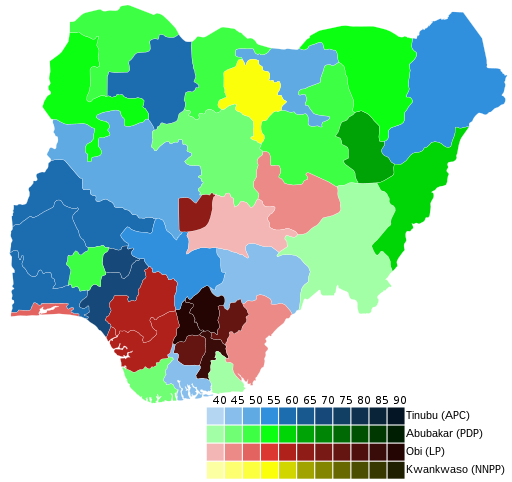Closing Thoughts on the Nigerian Presidential Elections
Posted on Mon 03 April 2023 in Nigeria

The 2023 Nigerian presidential election was held on February 25, 2023. The incumbent president, Muhammadu Buhari, was not on the ballot, as he had served the constitutionally permitted two terms in office.
The two main candidates were Bola Tinubu of the All Progressives Congress (APC) and Atiku Abubakar of the People's Democratic Party (PDP). Tinubu, a former governor of Lagos State, polled 36.61% of the vote, while Abubakar, a former vice president, polled 29.07%.
Peter Obi of the Labour Party came in third place with 25.41% of the vote.
The election was marred by allegations of voter fraud and violence. The Independent National Electoral Commission (INEC) has rejected the allegations of fraud, but some opposition parties have called for the results to be annulled.
The election has been seen as a test of Nigeria's democracy. The country has a history of violence and instability, but the 2023 election was largely peaceful.
The outcome of the election is likely to have a significant impact on Nigeria's economy and politics. Tinubu has promised to improve the economy and create jobs, while Abubakar has promised to fight corruption and improve security.
The election has also been seen as a referendum on Buhari's presidency. Buhari has been criticized for his handling of the economy and security, but he remains popular among many Nigerians.
The 2023 Nigerian presidential election was a historic moment for the country. The election was largely peaceful and the outcome is likely to have a significant impact on Nigeria's future.
Here are some of the key takeaways from the election:
- The APC remains the dominant party in Nigeria, winning the presidential election and controlling the majority of state governorships.
- The PDP remains a strong opposition party, but it failed to win the presidency or control a majority of state governorships.
- The Labour Party emerged as a significant force in Nigerian politics, winning 18% of the presidential vote and controlling two state governorships.
- The election was largely peaceful, but there were some reports of violence and intimidation.
- The Independent National Electoral Commission (INEC) was praised for its handling of the election, but some opposition parties raised concerns about voter fraud.
- The outcome of the election is likely to have a significant impact on Nigeria's economy and politics. The APC has promised to improve the economy and create jobs, while the PDP has promised to fight corruption and improve security.